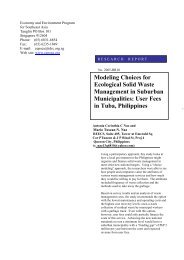systems research - the IDRC Digital Library - International ...
systems research - the IDRC Digital Library - International ...
systems research - the IDRC Digital Library - International ...
Create successful ePaper yourself
Turn your PDF publications into a flip-book with our unique Google optimized e-Paper software.
was considerable doubt cast, in <strong>the</strong> absence of any evidence, that resultant income<br />
changes would have a significant impact on <strong>the</strong> income-dependent variables<br />
originally listed. This was argued on <strong>the</strong> basis that <strong>the</strong>re was a wide range of o<strong>the</strong>r<br />
variables, both short- and long-term, that might frequently relegate <strong>the</strong> indirect<br />
influence of technological change to an insignificant role. This was not suggested as<br />
an excuse for not attempting <strong>the</strong>se tests. Ra<strong>the</strong>r, it was felt that <strong>the</strong> study of <strong>the</strong><br />
interrelationships between income changes with technology and <strong>the</strong>se o<strong>the</strong>r<br />
variables was complex and would be a study in itself. It was generally agreed that a<br />
study such as <strong>the</strong> present one might best be restricted to impact on income levels<br />
and distribution. This should not dampen enthusiasm toward broader aims.<br />
Guideline 2: Objectives should be achievable within <strong>the</strong> normal limits of time and<br />
project resources.<br />
To achieve all of <strong>the</strong> original objectives, <strong>the</strong> projects would have to be expanded in<br />
time, finances, and team size. It might be preferable to confine this type of study to<br />
a single site on a pilot basis to enable methodological alternatives to be tested.<br />
Formulating hypo<strong>the</strong>ses<br />
The discussion on <strong>the</strong> need to formulate explicit hypo<strong>the</strong>ses for FSR impact studies<br />
was lively. Some argued that setting objectives was sufficient; o<strong>the</strong>rs argued that<br />
<strong>the</strong>y were implicit in <strong>the</strong>ir studies; o<strong>the</strong>rs said that <strong>the</strong> objectives were hypo<strong>the</strong>ses.<br />
There was also a view that if hypo<strong>the</strong>ses were established and subsequently rejected<br />
by <strong>the</strong> analysis, <strong>the</strong>n <strong>the</strong> studies would lose value. Contrary arguments were put<br />
forward that objectives and hypo<strong>the</strong>ses were not synonymous. Hypo<strong>the</strong>ses, although<br />
difficult to formulate, added great potential value to <strong>the</strong> studies because <strong>the</strong>y<br />
epitomized mainstream questions. Finally, it was argued that rejection of evide~ce<br />
could often be as valuable as acceptance.<br />
Guideline 3: Future FSR impact studies should formulate explicit important<br />
hypo<strong>the</strong>ses for testing.<br />
Identification of new technologies<br />
The studies showed <strong>the</strong> difficulties in identifying <strong>the</strong> newness of <strong>the</strong> technologies<br />
under study. Some were new in <strong>the</strong> study locatlon but were not necessarily new<br />
elsewhere. One was not new in time, but it had been recently adapted in various<br />
ways and needed definition. Ano<strong>the</strong>r found that <strong>the</strong> composition of <strong>the</strong> new<br />
technology had evolved under <strong>the</strong> influence of farmer adaptation in <strong>the</strong> course of<br />
<strong>the</strong> 3-year study. Ano<strong>the</strong>r study involved elements of social differentiation and<br />
evaluation.
















